For the study, 209 farmers and 98 environmental scientists were interviewed about their perceptions of agricultural biodiversity and its management in Germany and Austria. Their perceptions were very different, "and show an urgent need for more interdisciplinary cooperation for sustainable development. Particularly crucial are the divergent perceptions of information sources," says Bea Maas, lead author from the University of Vienna.
The survey considered cross-disciplinary data and approaches as well as demographic factors in evaluating the responses. Key finding: scientists rate biodiversity, agri-environmental programs and conservation measures as more important for agricultural production, ecosystem resilience and sustainability than farmers. "Farmers, on the other hand, value information sources from the government and the agricultural sector," explains Anett Richter, co-author of the study from the Thünen Institute in Germany. Co-author Yvonne Fabian from Agroscope in Switzerland explains, "These different perspectives of scientists and farmers reveal crucial knowledge and communication gaps between agricultural research and practice." "Our findings are a plea to better integrate research, agriculture and policy practice," concludes co-author Sara Kross of Columbia University in the US.
The authors offer four specific recommendations for action on how knowledge and experience can be shared and used more effectively between agricultural science and practice:
First, make scientific information more accessible to practitioners by promoting and establishing education and extension programs for farmers. Second, develop targeted approaches to agricultural research and practice that integrate diverse stakeholder perspectives in their design and application. Third and fourth, support inclusive and integrative collaboration between science and practice by actively promoting cross-disciplinary communication. These efforts, according to Maas and her co-authors, "require partnerships and political commitment at the highest levels to make integrative approaches central to the development of sustainable agriculture."
Publication in Biological Conservation:
Maas B., Fabian F., Kross S.M., Richter A. (2021). Divergent farmer and scientist perceptions of agricultural biodiversity, ecosystem services and decision-making. Biological Conservation.
News & Events
What is agricultural biodiversity?
19.03.2021

© Free Pics / Unsplash / Ricardo Gomez Angel
